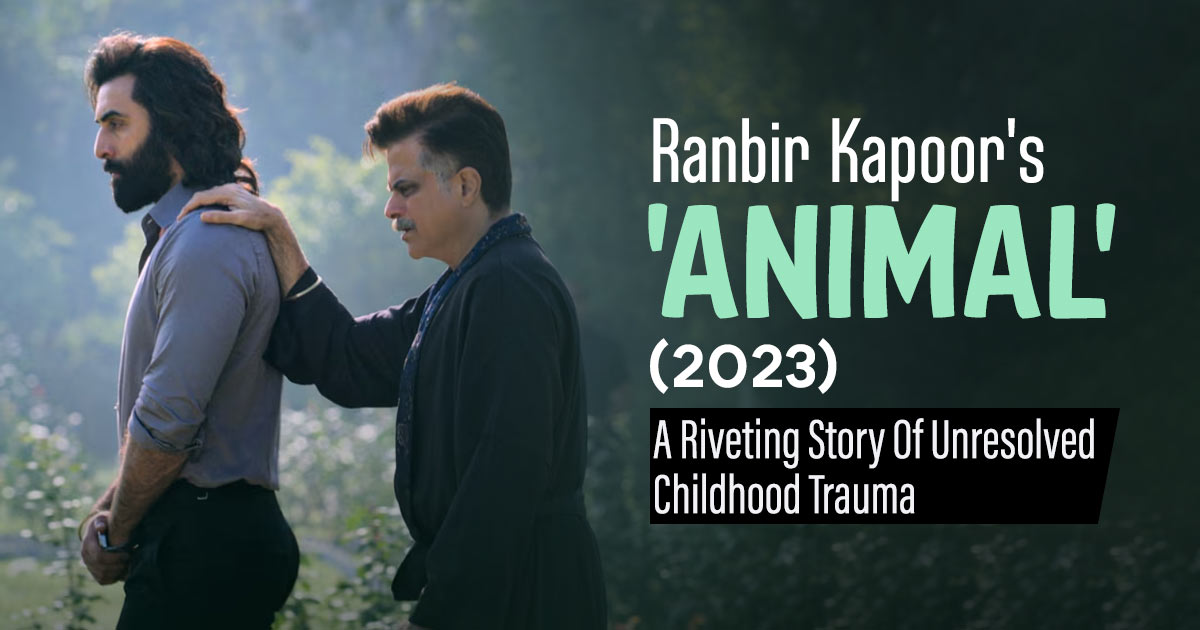Men’s mental health is a lesser charted territory in Hindi films. However, the trailer of the upcoming 2023 film, Animal, by Sandeep Reddy Vanga has been praised for its portrayal of childhood trauma and father wounds against the backdrop of a troubled father-son relationship.
The film follows the toxic dynamics between business magnate Balbir Singh and his son Arjun, portrayed by actors Anil Kapoor and Ranbir Kapoor respectively. Balbir is a controlling and abusive father to Arjun, but, despite the ill-treatment, Arjun idolizes him.
Arjun develops maladaptive coping strategies in an obsessive, over-validating love for his father and a violent determination to please him at all costs. When Balbir is attacked, Arjun develops a violent determination to protect his father, thereby triggering a gang war.
While the film is set to release on 1st December, as the trailer conveys, the movie promises to drive home the lasting impact of early-life adversity and negative childhood experiences on adults. It perfectly juxtaposes obsessive parental attachment and maladaptive coping strategies with the manifestation of trauma through external violence. It also seeks to show how untreated emotional issues in wounded parental relationships can result in behavioral disorders and dysfunctional social dynamics.
What Are Father Wounds?
Father wounds are emotional injuries caused by strained relationships with abusive or absent fathers or father-figures. Such injuries result from experiences characterized by emotional negligence, physical abuse or neglect, desertion, and a lack of good fathering.
Signs Of Father Wounds
The common signs of father wounds include:
- Difficulty trusting authority figures
- Low self-esteem
- Adjustment issues
- Intimacy issues in relationships
- Persistent seeking of validation or external approval
- Anger, aggression, and resentment
- Conduct and behavioral disorders
- Substance addiction
Father Wounds And Childhood Trauma: The Link
The connection between father wounds and childhood trauma is intricately interwoven, defining the emotional landscape of individuals since early years. Father wounds often serve as a source of immense emotional pain and regulation throughout the duration of a person’s life.
Children who encounter emotional abandonment, abuse, trauma, or neglect by fathers are more prone to developing mental health disorders and emotional problems. The influence of father wounds goes beyond immediate relationship difficulties and affects the child’s capacity to establish secure attachments, modulate emotions, and negotiate complexities in interpersonal relationships.
Additionally, the absence of a positive paternal figure can result in difficulties establishing security, self-esteem and stability in one’s emotionality. Feelings of incompetence, rejection, and isolation become part of suffering children who go on to develop maladaptive coping strategies that manifest in aggression, anger issues, resentment, jealousy, etc. Father wounds, if left untreated, can result in self-harm or suicidal thoughts–thus prompting the need for immediate assistance and care from others.
Addressing Father Wounds For Mental Health
Consider the following tips for addressing father wounds for mental health:
1. Therapeutic Intervention:
The healing of father wounds involves a complex process and cannot occur without seeking professional help through therapy or counseling. Individuals can freely express themselves and get guidance and assistance from therapists in their quest to overcome this pain.
2. Self-Reflection And Acceptance:
This is crucial for people with father wounds. Consequently, this involves being aware of what one feels, accepting them and oneself with compassion, as well as understanding that these issues will take time to heal.
3. Forgiveness And Boundaries:
One of the healing aspects of father wounds entails exploring forgiveness as not a way of endorsing past actions, but rather a method of letting go of emotional burdens. Additionally, for the good mental health, healthy boundaries should be set up with fathers whose relationships are still toxic.
4. Supportive Networks:
To gain the empathy necessary for healing in vulnerable people affected by father wounds, they should be encouraged to build a supportive network of friends, family or support groups.
5. Cultivating Positive Relationships:
Another way to deal with father wounds can be through positive influences that counterbalance them. Having healthy relationships promotes feelings of belongingness and safety.
6. Creative Expression And Healing Practices:
Holistic healing could be approached creatively through art, writing or other forms of expression as a therapeutic means to process emotions linked to father wounds. Similarly, cultural or spiritual healing practices consistent with personal beliefs also form part of the cure.Father wounds involve complex and deeply impactful issue that can have lasting effects on individuals.
Seeking therapy, support, and healing can help individuals to overcome the pain and trauma of father wounds, and ultimately find peace and healing. It is also important for society to acknowledge the prevalence and impact of father wounds, and work towards creating a culture that supports and values healthy father-child relationships.




























